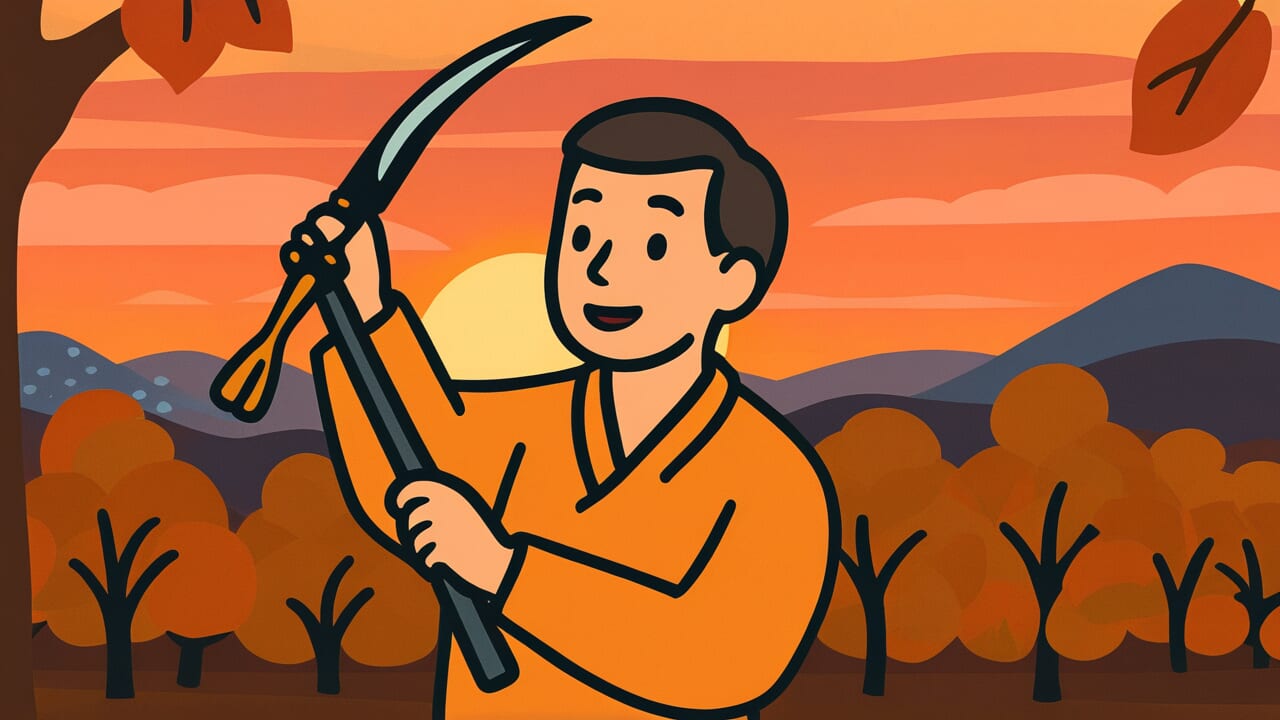How to Read “When the evening sky is red in autumn, sharpen your sickle”
Aki no yūyake kama wo toge
Meaning of “When the evening sky is red in autumn, sharpen your sickle”
This proverb teaches us to prepare well for work. When you see a beautiful red sunset in autumn, the next day will likely be sunny.
Autumn is harvest time, especially for rice. Farmers need to use every sunny day. By watching the sunset and sharpening their sickles at night, they could start work early the next morning.
People use this saying when they sense a good chance is coming. It reminds them to get ready ahead of time.
Today, it’s not just about farming. It means preparing for any opportunity you see coming. It shows the wisdom of watching nature and using what you learn in daily life.
Origin and Etymology
No one knows exactly when this proverb first appeared in writing. But it has been passed down for generations in Japanese farming villages.
The words tell us a lot. Autumn, sunset, and sickle all point to rice farming culture. This saying captures years of farming experience in one simple sentence.
The idea that red autumn sunsets predict sunny weather has scientific backing. In autumn, high-pressure weather systems move across Japan from west to east.
When the western sky turns red at sunset, it means clear weather is coming from the west. The air is dry and clean, so the red sunlight can travel far. This creates a beautiful sunset.
Farmers didn’t know the science, but they learned from experience. They noticed the pattern between autumn sunsets and next-day weather.
Rice harvest happens in autumn. Missing a sunny day could be a big problem. So when they saw a red sunset, they sharpened their sickles right away.
This proverb shows how carefully people watched nature. It also shows their mindset of never missing an opportunity.
Interesting Facts
Red autumn sunsets predict good weather for real scientific reasons. In autumn, high-pressure systems move from west to east across Japan.
A red western sky at sunset means the air there is clear and dry. That clear weather will reach Japan the next day. So autumn sunsets really are signs of good weather coming.
Sharpening a sickle meant more than just tool care. A sharp sickle makes work much faster and easier. It also reduces tiredness.
The act of sharpening itself was important too. It helped farmers prepare mentally for the next day. It was like a ritual that helped them focus and get ready.
Usage Examples
- Tomorrow looks sunny, so following “When the evening sky is red in autumn, sharpen your sickle,” I should organize my materials now
- I sense good things coming. “When the evening sky is red in autumn, sharpen your sickle” reminds me to prepare everything perfectly
Universal Wisdom
This proverb has lasted because it shows two important human abilities: preparation and observation. These skills matter greatly in life.
Chances seem to come suddenly, but they always have warning signs. Some people notice these signs and some don’t. Some who notice prepare, and some don’t. This difference creates big results in life.
Farmers couldn’t control nature. So they learned to watch it carefully and read its signs.
They found useful information in a beautiful sunset. They could predict tomorrow’s weather. This observation skill is something modern people are losing.
There’s a deeper lesson about preparing. Sharpening a sickle wasn’t just about fixing a tool. It was also time to prepare mentally.
Farmers turned their excitement and nervousness into focused work. This mental preparation helped them perform their best when the opportunity came.
Through preparation, humans can change worry about the future into hope. This is a powerful ability we all have.
When AI Hears This
A sunset contains surprising amounts of information. In weather science, a red western sky means the upper air is dry.
Weather moves from west to east. So the chance of sun tomorrow jumps to 70-80 percent. Farmers predicted tomorrow’s work conditions from just seconds of looking at the sky.
Notice that this proverb doesn’t just predict weather. It tells you to take action: “sharpen your sickle.” This is smart decision-making.
Think about the costs and benefits. Sharpening a sickle costs only time and effort. If it rains anyway, you lose little. But if it’s sunny and your sickle is dull, you lose a lot of harvest time.
The cost of preparing when you don’t need to is low. The cost of not preparing when you should is high. With this imbalance, even 70 percent accuracy makes preparation worth it.
Modern spam filters and medical tests work the same way. Perfect prediction is impossible. But by calculating signal reliability and error costs, you find the best action point.
Farmers figured out this optimal decision without any math. That’s impressive wisdom.
Lessons for Today
This proverb teaches you to notice small signs and act on them. Modern life is full of information, but few people catch the truly important signals.
Are you distracted by social media notifications and news headlines? You might be missing small changes and signs around you.
People say opportunity only has hair in front. Once it passes, you can’t grab it. The key is preparing before chances arrive.
Don’t study all night before a test. Real preparation is daily practice. Build your skills before big projects come. Work on yourself before meeting great people.
Preparation is investing in your future. Just like farmers sharpened sickles after seeing sunsets, you should value small daily preparations.
These small efforts add up. Someday they’ll give you the power to grab big chances.
Listen to nature’s signs. Always keep your mind prepared. If you can live this way, your life will become much richer.



Comments